Syrian ‘peace talks’ is due to start in Switzerland, with events and comments preceding the official opening leave close to no hope of a major breakthrough, other than bringing President Bashar al-Assad's regime and the opposition to the same table.
International diplomats and Syria's warring sides arrived for the crucial peace conference which kicks off in the town of Montreux on Lake Geneva on Wednesday, after months of wrangling that had threatened to derail the talks up until the last minute.
British Foreign Secretary William Hague called upon all sides involved in Syria's bloody civil war to "seize the chance" for peace.
There were stark reminders of the Syrian conflict's impact in the run-up to the talks, with a bombing in Beirut that left four dead and new evidence alleging that Assad's forces have systematically killed and tortured thousands.
The Geneva 2 conference managed to override a diplomatic spat between allies of the Syrian regime and the UN over a last-minute reversal which saw the organization's leader Ban Ki-moon withdraw an invitation to Iran, less than 24 hours after he had announced it.
Syria's opposition had threatened to boycott the talks if Iran, a key backer of the Assad regime, took part. West-backed opposition camp the Syrian National Coalition had threatened the same if Iran attended.
This week's talks will be the most intensive diplomatic effort yet to resolve Syria's war, which after nearly three years has left 130,000 dead and millions forced from their homes.
Arriving for the talks, Syrian Foreign Minister Walid Muallem dismissed opposition demands for Assad to step down.
The talks have highlighted the deep divisions among the ranks of the opposition raising questions on how much is its 15-member delegations are representative Assad's opponents.
The biggest bloc in Syria's opposition-in-exile, the Syrian National Council, said on Monday it was quitting the coalition because taking part in the talks would renege on its "commitments" to not enter negotiations until Assad leave power.
In an AFP interview published on Monday, Assad bluntly ruled out a power-sharing deal. He insisted the peace conference should focus on what he called his "war against terrorism".
PHOTO CAPTION
U.S. Secretary of State John Kerry (L) meets Russia's Foreign Minister Sergey Lavrov in Montreux, Switzerland, January 21, 2014.
Al-Jazeera


 Home
Home Discover Islam
Discover Islam Quran Recitations
Quran Recitations Lectures
Lectures
 Fatwa
Fatwa Articles
Articles Fiqh
Fiqh E-Books
E-Books Boys & Girls
Boys & Girls  Hajj Rulings
Hajj Rulings Hajj Fatwas
Hajj Fatwas














